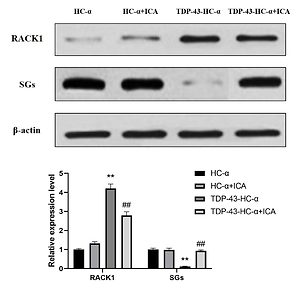Current issue
Archive
Manuscripts accepted
About the Journal
Editorial office
Editorial board
Section Editors
Abstracting and indexing
Subscription
Contact
Ethical standards and procedures
Most read articles
Instructions for authors
Article Processing Charge (APC)
Regulations of paying article processing charge (APC)
OSTEOPOROSIS / RESEARCH PAPER
Icariin interferes with TDP43-induced inflammatory factor secretion and inhibits the JNK and p38 MAPK signaling pathway in vitro
1
Guangzhou Hospital of Integrated Traditional and Western Medicine, China
Submission date: 2020-07-27
Final revision date: 2020-10-05
Acceptance date: 2020-11-14
Online publication date: 2021-04-30
Corresponding author
KEYWORDS
TOPICS
ABSTRACT
Introduction:
To investigate the molecular mechanism of icariin (ICA) intervention in TDP-43 mediated chondrocyte lesions of osteoarthritis.
Material and methods:
HC-α chondrocytes were transfected with TDP-43 lentiviruses to generate TDP-43-overexpressing chondrocytes and treated with 5 μg/mL icariin. The level of TDP-43, JNK, p38 MAPK and relative factors were detected by Western blotting assays. TNF-α and IL-1β in the supernatant were determined by ELISA.
Results:
Compared with the HC-α group, TDP-43 expression was significantly increased in the TDP-43-HC-α group and was not significantly different that of the HC-α+ICA group. However, TDP-43 expression in the TDP-43-HC-α+ICA group was significantly lower than that in the TDP-43-HC-α group. ELISA showed that the secretion of TNF-α and IL-1β in the supernatant of the TDP-43-HC-α group was significantly increased (P<0.01) compared with the HC-α group, but was significantly lower in the supernatant of the TDP-43-HC-α+ICA group than that of the TDP-43-HC-α group (P<0.01). ICA treatment reduced the expression of TDP-43 in chondrocytes and inhibited the elevation of inflammatory cytokines caused by TDP-43. ICA processing can also inhibit the activation of JNK/p38 MAPK related signaling pathways caused by TDP-43. Overexpression of TDP-43 reduced the formation of stress granules (SGs)in chondrocytes, and increased receptor for activated protein kinase C1 (RACK1) level. ICA could reverse these changes.
Conclusions:
Icariin could interfere with TDP-43-induced secretion of inflammatory factors, inhibit JNK/p38 MAPK signaling. Our findings provided a new theoretical basis for the treatment of osteoarthritis.
To investigate the molecular mechanism of icariin (ICA) intervention in TDP-43 mediated chondrocyte lesions of osteoarthritis.
Material and methods:
HC-α chondrocytes were transfected with TDP-43 lentiviruses to generate TDP-43-overexpressing chondrocytes and treated with 5 μg/mL icariin. The level of TDP-43, JNK, p38 MAPK and relative factors were detected by Western blotting assays. TNF-α and IL-1β in the supernatant were determined by ELISA.
Results:
Compared with the HC-α group, TDP-43 expression was significantly increased in the TDP-43-HC-α group and was not significantly different that of the HC-α+ICA group. However, TDP-43 expression in the TDP-43-HC-α+ICA group was significantly lower than that in the TDP-43-HC-α group. ELISA showed that the secretion of TNF-α and IL-1β in the supernatant of the TDP-43-HC-α group was significantly increased (P<0.01) compared with the HC-α group, but was significantly lower in the supernatant of the TDP-43-HC-α+ICA group than that of the TDP-43-HC-α group (P<0.01). ICA treatment reduced the expression of TDP-43 in chondrocytes and inhibited the elevation of inflammatory cytokines caused by TDP-43. ICA processing can also inhibit the activation of JNK/p38 MAPK related signaling pathways caused by TDP-43. Overexpression of TDP-43 reduced the formation of stress granules (SGs)in chondrocytes, and increased receptor for activated protein kinase C1 (RACK1) level. ICA could reverse these changes.
Conclusions:
Icariin could interfere with TDP-43-induced secretion of inflammatory factors, inhibit JNK/p38 MAPK signaling. Our findings provided a new theoretical basis for the treatment of osteoarthritis.
We process personal data collected when visiting the website. The function of obtaining information about users and their behavior is carried out by voluntarily entered information in forms and saving cookies in end devices. Data, including cookies, are used to provide services, improve the user experience and to analyze the traffic in accordance with the Privacy policy. Data are also collected and processed by Google Analytics tool (more).
You can change cookies settings in your browser. Restricted use of cookies in the browser configuration may affect some functionalities of the website.
You can change cookies settings in your browser. Restricted use of cookies in the browser configuration may affect some functionalities of the website.



